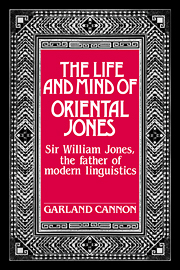Book contents
- Frontmatter
- Contents
- Preface
- Introduction
- Chronology of Jones's Life
- 1 A Barbaric Oriental Conqueror (to 1770)
- 2 Delicate Arab Maidens and Liquid Ruby (1770–1772)
- 3 Persian Jones and Constitutional Law (1772–1777)
- 4 The Athenian and Eleutherion (1778–1780)
- 5 An Ass Laden with Gold (1780)
- 6 Politics: Writings and Activism (1780–1782)
- 7 James River Property (1782–1783)
- 8 A Vision in the Indian Ocean (1783–1785)
- 9 A Sacred Oriental Language (1785)
- 10 A Genetic Explanation: Indo-European (1786–1787)
- 11 Sanskrit Literary Treasures (1787–1788)
- 12 An Indian Renaissance (1789)
- 13 A Burning Tropical Sun (1790–1791)
- 14 Scholar-Martyr (1791–1794)
- 15 Jones Today
- Appendix Five New Letters by Jones
- Notes
- Selected Bibliography
- Index
7 - James River Property (1782–1783)
Published online by Cambridge University Press: 11 September 2009
- Frontmatter
- Contents
- Preface
- Introduction
- Chronology of Jones's Life
- 1 A Barbaric Oriental Conqueror (to 1770)
- 2 Delicate Arab Maidens and Liquid Ruby (1770–1772)
- 3 Persian Jones and Constitutional Law (1772–1777)
- 4 The Athenian and Eleutherion (1778–1780)
- 5 An Ass Laden with Gold (1780)
- 6 Politics: Writings and Activism (1780–1782)
- 7 James River Property (1782–1783)
- 8 A Vision in the Indian Ocean (1783–1785)
- 9 A Sacred Oriental Language (1785)
- 10 A Genetic Explanation: Indo-European (1786–1787)
- 11 Sanskrit Literary Treasures (1787–1788)
- 12 An Indian Renaissance (1789)
- 13 A Burning Tropical Sun (1790–1791)
- 14 Scholar-Martyr (1791–1794)
- 15 Jones Today
- Appendix Five New Letters by Jones
- Notes
- Selected Bibliography
- Index
Summary
Realizing that Thurlow and the Court of Appeal would delay his judicial appointment at least until early 1783, Jones had agreed to accompany Paradise. Needing Franklin's help with the Virginia estate, the pair would sail from France. Paradise, who had been afraid to go alone, was delighted. Jones would serve as an advocate and witness, hoping to prevent a lawsuit. Friendship rather than the liberal payment was a major inducement, and he hoped to return before Christmas.
For the first time Jones would miss an entire circuit, a major source of income. Why not? Although the judgeship might have been filled without new legislation, Thurlow had thwarted his aspiration since becoming chancellor and would undoubtedly continue to do so. And as the Whigs had erred in letting the king retain a man whose views were so royalist, Jones despaired of the appointment and even the Whig prospects for now. Because he espoused the principle that citizens could migrate when their country suppressed liberty, perhaps his real future lay in Charleston or Pennsylvania. Laurens and Franklin might help him assist a government of separated powers based on near-universal suffrage and liberty, and Paradise would pay his fees in the form of choice property along the James River.
American friends had led him to wonder whether England was rejecting his qualifications. A lawyer of his capacities would have manifold opportunities in the new country, which, he firmly believed, had to be granted independence before there could be a peace treaty.
- Type
- Chapter
- Information
- The Life and Mind of Oriental JonesSir William Jones, the Father of Modern Linguistics, pp. 171 - 194Publisher: Cambridge University PressPrint publication year: 1991



